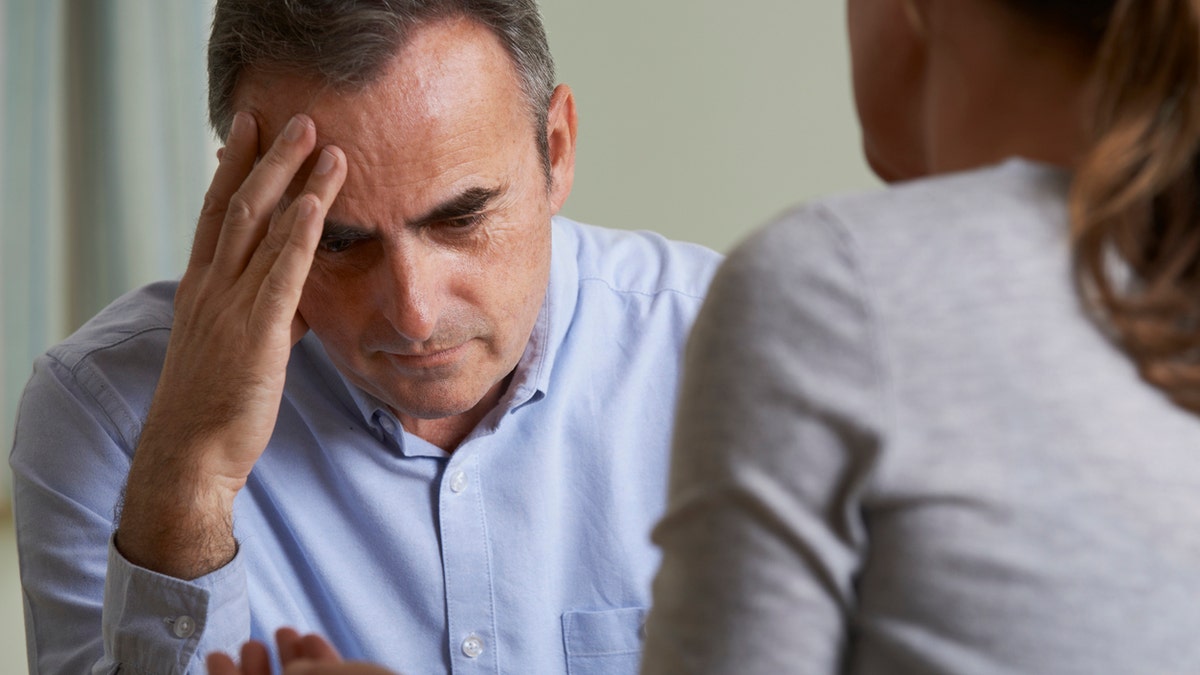
Depressed Mature Man Talking To Counsellor (iStock)
Is the current political climate stressing you out?
If so, you’re not alone.
A majority of Americans — 57 percent, in fact — are suffering from post-election stress, according to a survey released this week by the American Psychological Association (APA). Nearly half of those surveyed, which included both Democrats and Republicans, reported that the political climate was either a very significant or somewhat significant source of stress. Two-thirds, or 66 percent, said they were stressed about the future of the nation, according to the APA.
"The research is very clear on the fact that uncertainty or a lack of control is a very strong source of stress,” Dr. Jim Diaz-Granados, executive director of education at the APA, told Fox News. “If you look at the campaign and into the election, we certainly are at a time of a lot of change and a lot of uncertainty, and I would say that probably the level of predictability is less, and so it would be reasonable to surmise that stress would increase.”
He noted that any kind of change, be it negative or positive — like getting married or buying a new home — can trigger a stress response.
“Those also contribute to feelings of stress, so again back to the idea of ‘there’s been a lot of change going on,’ and so I think people are reacting to that,” Diaz-Granados said.
After noticing a rising number of Americans seeking mental health help after the election, the APA decided to analyze political election-related stress levels for the first time in its annual survey, which it has conducted for the past 10 years.
Previously, Americans ranked work- and money-related concerns as their top stressor, but since the inception of the survey, the APA has never seen the the No. 1 stressor rank as high as post-election stress does this year.
“The only ones that have come close to being two-thirds were around 59 to 62 percent, so it was quite striking to see the extent to which people were identifying this as a significant source of stress,” Diaz-Granados said.
While many communities across the country saw spikes in requests for counseling after the election, crisis lines have meanwhile been flooded with similar cries for help.
If the latest findings from the APA are any indication, Americans are still struggling to find ways to cope post-election.
To help better manage your post-election stress, Diaz-Granados offered the following tips:
1. Prioritize self-care
“Exercise is a particularly very effective way of dealing with stress,” Diaz-Granados said. “It’s a way of losing yourself in the exercise, whether it’s running cycling or walking.” Physical exercise can help reduce stress and release endorphins, a natural reliever of depression and anxiety symptoms. Diaz-Granados advised consuming a nutritious diet, too, because during times of high stress, people may turn to alcohol or fatty foods to help cope.
2. Get involved
Seeking out opportunities in your community can help reduce stress, said Diaz-Granados, who has a doctorate in psychology. “Finding places to volunteer for folks who have a passion or interest — certainly, that is a very good way of taking a break from the election [talk].”
3. Seek help if you need it
“It’s important to know that when you are feeling stress, and especially over a long period of time, or chronically day in and day out, that that can have physical consequences,” like headache or stomachache, Diaz-Granados said. “We really do advise people to take care of that and be aware of their feelings of stress, and to take a break, and also seek professional help if they need to.”
4. Limit your exposure to social media
In this day and age, it may be tempting to check your Facebook or Twitter feed on the regular, but limiting your exposure to online chatter yet making an effort to stay informed can help you stay sane. “Given the environment that we’re in, one of our recommendations is that people need to be mindful of that," Diaz-Granados said.







































